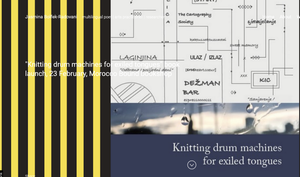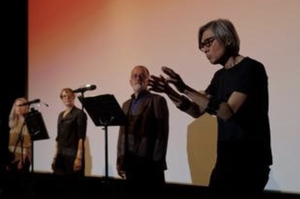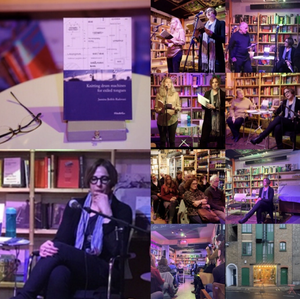As an art form concerned with unpacking discourses of power, multilingual poetry has the potential to make language stutter, as it has to make it vibrate again. How we define multilingual poetry has primarily to do with how we define language.Jasmina Bolfek-Radovani, ‘“Reveries about language”: challenges and opportunities of performing multilingual poetry’, Language Acts and Worldmaking ‘Languages Future’ virtual conference, April 2021
In the pulsing heart of language, of languages, words and images and sounds interweave, vibrate; memories and experiences and places intertwine, reverberate; symbols recur, resonate. Jasmina Bolfek-Radovani’s multilingual and multisensorial performance-practice engages multifaceted corporeal, emotional and intellectual experiences of the poet and of her readers/listeners/spectators/audience in English, French, Croatian and beyond, not least in the ‘shadow language’ Arabic.
At readings and performances of Jasmina’s work, it is striking to witness the reaction of audience members to hearing and experiencing a language or languages which they do not necessarily speak or understand. The reception of this multilingual poetry is overwhelmingly open, curious, alert to its sounds and rhythms and the images they conjure. A responsive, attentive engagement in the exploration of the often unknown and the unfamiliar, resisting divisions and borders, hesitancies and fears. In private, silent (or perhaps not so silent) reading, similar experiences occur as eye and mind and tongue engage with the multiplicity of language and with multiple languages.
Jasmina’s latest collection Knitting drum machines for exiled tongues (Tears in the Fence, 2022) was launched, alongside a reading performance of a selection of the poems with Jasmina Bolfek-Radovani and Bridget Knapper, introduced by David Caddy and in conversation with Debra Kelly, at the gem of a bookshop, Morocco Bound in Morocco Street, Bermondsey, London (do go there to find a book in the carefully curated selection, stay for a drink, enjoy all sorts of events…) on 23rd February 2023.

In this new collection, ‘the poet folds the languages into and through each other to emphasise resonances, echoes and play […]. Throughout the book, the sense is of the individual poems interpenetrating […] pieces are titled individually, yet the text functions as one larger variously articulated project’ (Mark Leahy, 2023; Stride magazine, 'this isn't a palimpsest about loss'). The form of each of the thirty-five multilingual poems in the collection holds its own meaning, contributing to the greater whole while celebrating its own uniqueness. As the overview of the collection explains, these poems are structurally interwoven with thirteen visual-textual fragments (‘patterns’) and three ‘poem-tattoos’ or ‘tattooed’ drawings through the narrative device of ‘enchâssement’ (embedding). These ‘tattooed’ graphic texts, a term rich in cultural and linguistic reference irresistibly recalling the Moroccan writer and thinker Abdelkébir Khatibi’s ‘mémoire tatouée’, pose a challenge – certainly a pleasurable and playful, but also enigmatic, one – for the reader. Here is also an act of encoding and therefore of decoding, of deciphering to be done in order to journey forwards and backwords across the terrains of the collection. Beyond an approach to writing multilingual poetry conceived as a poetic and linguistic experiment or laboratory, the experience entails what the poet evocatively describes as, ‘a play with language and a language (inter)play’ (Jasmina Bolfek Radovani, ‘“Unbound” Lines: Writing in the Spaces of the Multilingual, Balkan Poetry Today, February 2018). And, at the physical, emotional, textual heart of the collection lie the ‘Heart monologues’, a sequence of thirteen multilingual poems in French, English and Croatian. More than a metaphor, an image, a symbol, these heartbeats send out creative impulses which give expression to the fullness and lack of language, to the harmonies, dissonances and rhythms of languages; these (im)pulses articulate memory, loss, the in-betweenness of identity, culture, language.
I ask you again – Si je suis un heartcœursrce ordinaire, what languages jezike langues do I speak?‘Heart monologues 13’
When performed, the ‘Heart monologues’ form a thirty-minute multisensory recital based on this sequence of poems which combines them with recorded and live voices of the readers and often with music by the composer Atau Tanaka who performs live using heart and muscle sensors connected to a modular synthesiser. At the premiere of ‘Heart monologues’ in the historic Regent Street Cinema in London as part of the University of Westminster’s ‘World in Westminster’ Festival in March 2022, the performance brought together the ‘monologues’ with recorded and live voices, sound and the musical track ‘Heartbeat Monitor’ (Biorhythms, 2000) composed by Atau Tanaka who also performed a more recent piece ‘Myogram’ (Meta Gesture Music, 2017) live using embodied musical interaction technologies. In a visual, verbal, sonic collaboration, the corporeal, visceral beats, pulses, rhythms of the poems come into multifaceted being.

Photo: Martin Delaney
The journey of Jasmina’s poetic and theoretical work has been interwoven at various stages with that of Language Acts and Worldmaking. Her multilingual poetry project ‘Unbound’ and its performances were supported by Languages Acts in 2018-19 and her collection Reveries about language, Sanjarenje o jeziku, Rêveries autour la langue was published by Language Acts in 2019 (under the imprint of the Faculty of Arts and Humanities, King’s College London). She has spoken and performed at Language Acts events and conferences, notably in June 2019 to present ‘Unbound’ and to perform ‘Reveries about language: Word Sound Image’ at the Worldmaking Live Festival at King’s (directed by Jasmina; readings by Jasmina with Bridget Knapper) as part of our summer-long ‘Languages Now’, Worldmaking Fair. This followed an earlier performance, book launch and panel discussion in March that year of ‘Reveries’ in the Pinter Studio, Queen Mary University of London (co-directed and co-organised by Jasmina and Catherine Boyle). From Reveries about language to Knitting drum machines for exiled tongues, with detours via poems published widely across other collections and magazines and insightful essays drawing on Jasmina’s deep well of theory and thought on the nature of language and our relationships to languages, Language Acts and Worldmaking continues to accompany her on this journey to, into and in poetry. Like all her readers and audiences, we share the experience of coming to poetry writing and of how the practice of poetry and – essentially – the poetic voice come into being(s), take shape(s), find expression(s).
Of poetic creation in three languages, Jasmina writes:
The three versions of the poem that I have written become translation of something that does not reside at the level of the linguistic; they become representations, reflections of a non- linguistic form of thought, of a series of images that exist ‘before’ language and that only acquire their meaning and linguistic form in the system of language(‘“Unbound” Lines: Writing in the Space of the Multilingual’)
An inquiry into the processes by and through which language shapes our lives and our world and into the work language does in the world, Jasmina’s multilingual poetic performance-practice also shares what lies at the heart of Language Acts and Worldmaking: multilingual aesthetics and practices which embody both a poetics and a politics.
In a post-Covid and post-Brexit world concerned with the closing of borders and characterised by a renewed interest in national identity, multilingual poetry is increasingly gaining new ground. I believe this is so not only because of its poetic possibilities, but also because of its power to challenge, disrupt and subvert unilingual and monolingual thinking and practices that are still very much the norm.Jasmina Bolfek-Radovani, ‘“Reveries about language”: challenges and opportunities of performing multilingual poetry’
To find out more about Jasmina’s poetry, collections and essays, please visit: https://jasminabradovani.com/
To find out more about her readings and performances in conceived and performed in London, Paris, Brussels, Zagreb, Pula…. please visit: https://jasminabradovani.com/portfolio/performances-recitals

Photos: Martin Delaney and Morocco Bound Bookshop